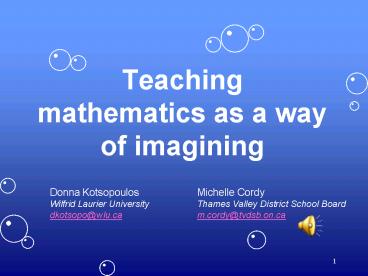Teaching mathematics as a way of imagining - PowerPoint PPT Presentation
1 / 20
Title:
Teaching mathematics as a way of imagining
Description:
'Providing a natural home for that something in the mind's mind' ... Different than visualization which is an act of bringing a ' ... Woolly Jumper. What did ... – PowerPoint PPT presentation
Number of Views:61
Avg rating:3.0/5.0
Title: Teaching mathematics as a way of imagining
1
Teaching mathematics as a way of imagining
Donna Kotsopoulos Michelle Cordy Wilfrid Laurier
University Thames Valley District School
Board dkotsopo_at_wlu.ca m.cordy_at_tvdsb.on.ca
2
Today
- Introduction of our framework
- Experiments with bubbles
- Conclusions.
3
Imagination
- Providing a natural home for that something in
the minds mind (p. 138) , in new ways, that
resists familiar types of mental image-making
activities (p. 138) - Different than visualization which is an act of
bringing a picture into the minds screen (p.
138) with already existing mental equipment (p.
138) - Imagination has no pre-existing mental equipment
and is unfamiliar.
4
Three stages of the teaching mathematics as a way
of imagining framework
- Stage 1 Before imagination
- Stage 2 During imagination
- Stage 3 After imagination.
5
About bubbles
- Bubbles are made from bubble film
- Bubble film has may properties that have been
learned about through experiments.
6
Experiment 1 The Bubble Trampoline
- What did we learn
- Bubble film is elastic and stretches. This is
what allows bubble film to make bubbles.
7
Experiment 2 Woolly Jumper
- What did we learn
- The tension in the bubble film will always try
to shrink the film to make the smallest surface
possible.
8
Before imagination
- Finding a problem worth investigating
- Beginning with a visual
- Stretching the imagination through pedagogical
angling (Mazur, 2003, p. 5) - Corralling which involves bracketing and defining
the pertinent knowledge, prior and current,
necessary for the imagination to develop (Mazur,
2003, p. 63). - Michelle Video.
9
Experiment 3Imagining Bubbles
- Make bubble blowers in a variety of shapes.
- Predict the shape of the bubble.
- What did we learn
- Bubble film always forms
- the shape of a sphere.
Recipe for bubbles
10
During imagination
- Continued angling
- Continued stretching
- Seeing and squinting.
11
- ?
- Why is it that when we blow
- bubbles with all these
- different shapes, the
- bubble is always a sphere?
12
What do we know about bubble films
- The surface of bubble films is elastic
- The surface of bubble films stretches
- The shape of bubble films is always a sphere
- The surface area of bubbles will always try to
shrink to make the smallest amount of surface
area. - Bubble films always make the shape of a sphere
because spheres have the smallest surface area
for a given volume.
13
Experiment 4Cubical Bubble
- Imagine what shape the bubble film will be inside
the cube. - What is your prediction about the kind of bubble
that will be made inside the cube?
14
Why is the shape insidea cube a sphere?
- When bubbles and bubble films meet, they always
obey certain - rules
- Films and edges always meet each other at equal
angles (based on 360 degrees), so three films
meeting at an edge will be 120 and four films
will be 90 apart - There are never more than two films at an edge
- There can never be more than four edges or six
films meeting at a point. - These rules are known as the "Golden Rule of
Bubbles."
15
After imagination
- Specific aesthetic responses can be seen as
changes that have found habitation within the
corralled cognitive spaces defined initially by
the teacher, and more largely within the
discipline - Yoking of hybrid intuitions through multiple
representations - More problem posing.
16
What next .
- How can we be sure that the sphere has the
smallest surface area? - What can we do to prove this?
17
Teaching mathematics as a way of imagining
- Requires a problem worth investigating
- Begins with a visual
- Has three pedagogical stages
- Pedagogical skills corralling, angling, seeing
and squinting yoking - Different then other frameworks because of the
importance o f the beginning with visual (versus
a real world problem which is the current
emphasis).
18
Selected references
Egan, K. (1992). Imagination in teaching and
learning. London, Ontario The Althouse
Press. Egan, K. (2005). An imaginative approach
to teaching. San Francisico, California John
Wiley Sons. Gadanidis, G. (2006). Imagination
and digital mathematical performance. Paper
presented at the Canadian Mathematics Education
Study Group (CMESG), Calgary, Alberta. Hilbert,
D., Cohn-Vossen, S. (1952). Geometry and the
imagination (P. Nemenyi, Trans.). New York
Chelsea Publishing Company. Kasner, E., Newman,
J. (1940). Mathematics and the imagination. New
York Simon and Schuster, Inc. Mazur, B. (2003).
Imagining numbers (particularly the square root
of minus fifteen). New York Farrar, Straus and
Giroux. Taylor, J. (1993). Bubble, Bubble Jean
Taylor and the Mathematics of Minimal Surfaces.
The Sciences, 33(May/June), 32-38. http//questac
on.edu.au/html/bubbles.html
19
Questions and Feedback
- Donna Kotsopoulos
- Wilfrid Laurier University
- dkotsopo_at_wlu.ca
- Michelle Cordy
- Thames Valley District School Board
- m.cordy_at_tvdsb.on.ca
20
Recipe for bubbles
- 3 parts dishwashing liquid
- 7 parts hot water
- 1 part glycerol (or sugar)
- The glycerol or sugar helps the bubbles to last
longer, by preventing them from drying out - Mix the ingredients very thoroughly
- Bubble mix gets better with age
- Bubbles burst when they dry out, so the more
humid it is the longer they last - Bubbles work best at night, in the shade and
while it is raining - Froth on the top can interfere with making
bubbles.































